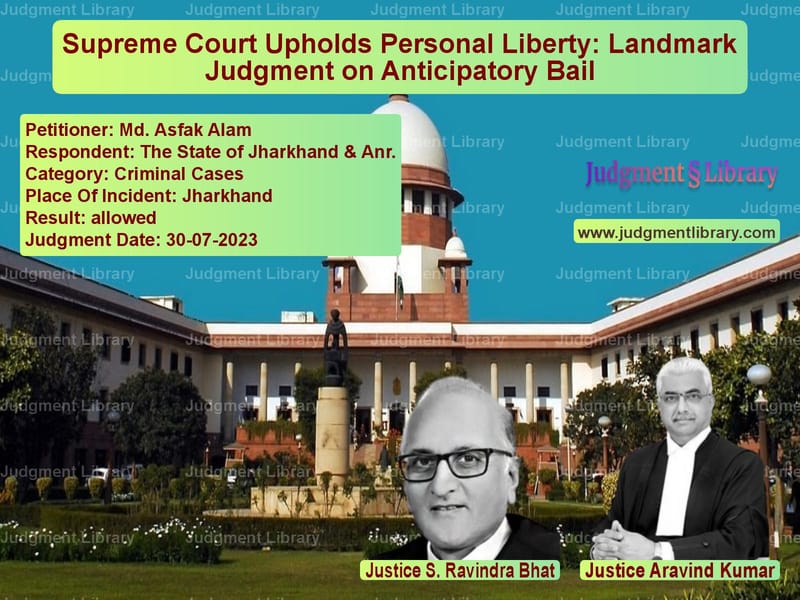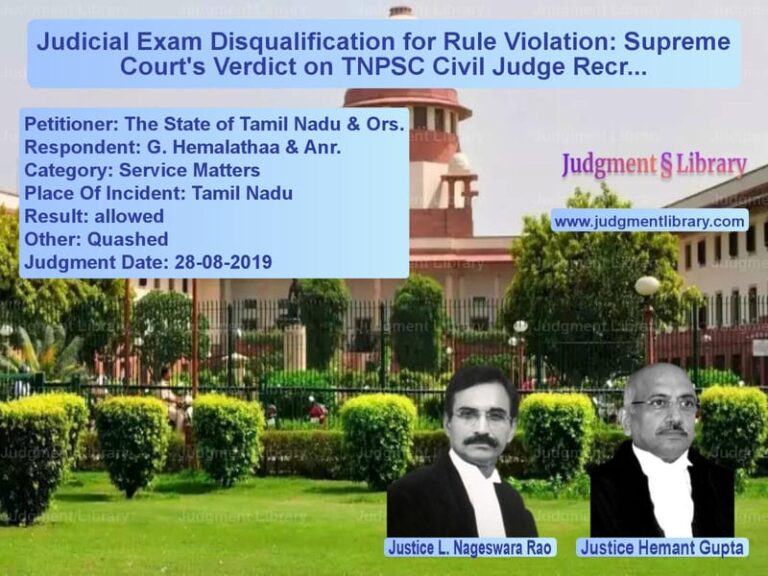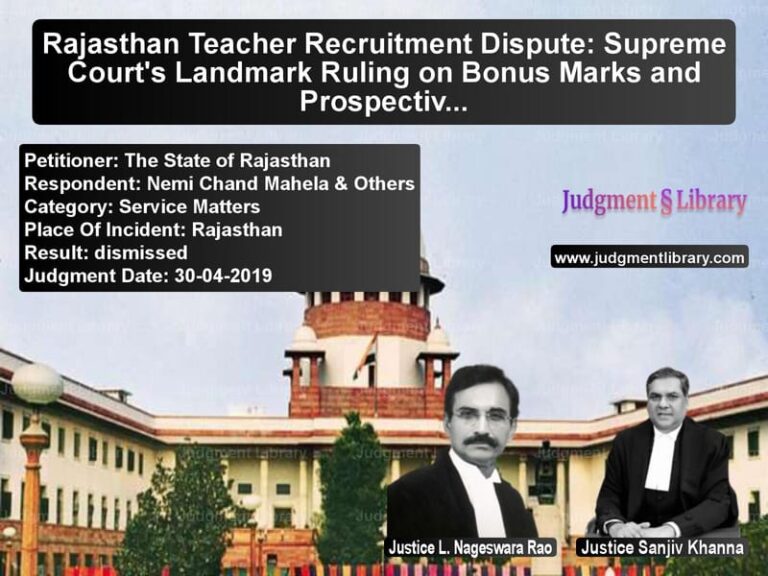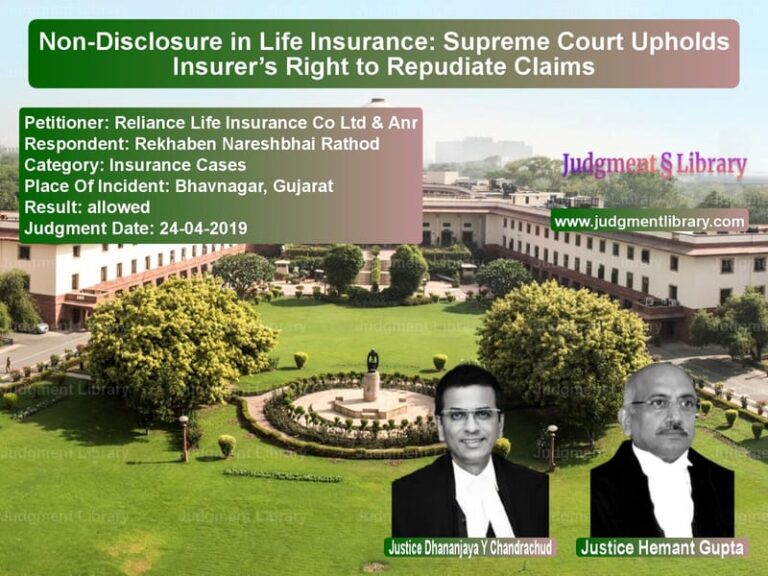Supreme Court Upholds Personal Liberty: Landmark Judgment on Anticipatory Bail
The Supreme Court of India, in the case of Md. Asfak Alam v. The State of Jharkhand & Anr., delivered a significant judgment addressing anticipatory bail and its impact on personal liberty. This case highlights the principles governing pre-arrest bail and emphasizes the importance of preventing arbitrary arrests in cases involving matrimonial disputes.
The judgment reiterates the need for courts to exercise caution while denying anticipatory bail, ensuring that fundamental rights are not violated without due process. The Supreme Court’s ruling sets an important precedent in protecting personal liberty and upholding the right to fair legal proceedings.
Background of the Case
The appellant, Md. Asfak Alam, and the second respondent were married on November 5, 2020. Soon after their marriage, conflicts arose between them, allegedly due to interference from the wife’s father. These disputes led to legal actions, with both sides lodging complaints against each other.
On April 2, 2022, the police registered an FIR against the appellant and his family members under:
- Section 498A (cruelty by husband or relatives) of the Indian Penal Code (IPC),
- Section 323 (voluntarily causing hurt),
- Section 504 (intentional insult to provoke breach of peace),
- Section 506 (criminal intimidation),
- Section 3 & 4 of the Dowry Prohibition Act.
Fearing arrest, Alam applied for anticipatory bail under Section 438 of the Code of Criminal Procedure (CrPC) before the Sessions Judge, Gumla, Jharkhand. The court rejected his plea on June 28, 2022. Subsequently, he moved the Jharkhand High Court, where an interim order was passed on August 8, 2022, protecting him from arrest. However, the High Court later dismissed his application on January 18, 2023, directing him to surrender and seek regular bail.
Legal Issues Raised
The primary legal questions before the Supreme Court were:
- Whether anticipatory bail can be denied even after the charge sheet has been filed?
- What criteria should be considered while granting or denying pre-arrest bail?
- Should an accused be required to surrender after having cooperated with the investigation?
Petitioner’s Arguments
The appellant argued that his arrest was not necessary since he had cooperated with the investigation and the charge sheet had already been filed. His counsel submitted:
- That the High Court had failed to consider the distinction between the existence of the power to arrest and the justification for exercising that power.
- That the Supreme Court, in Arnesh Kumar v. State of Bihar, had laid down clear guidelines restricting mechanical arrests in matrimonial cases.
- That anticipatory bail is an essential safeguard against unnecessary arrests, particularly in cases where custodial interrogation is not required.
- That denying anticipatory bail despite the absence of serious allegations and directing the accused to surrender was unjust and contrary to legal principles.
Respondent’s Arguments
The State opposed the anticipatory bail application, contending:
- That merely filing a charge sheet does not automatically entitle an accused to anticipatory bail.
- That the allegations against the accused were serious, including repeated harassment and threats to the complainant’s life.
- That the complainant had accused the appellant of threatening to inject her with a substance that would simulate a heart attack.
- That anticipatory bail should not be granted as a matter of right but should be considered based on the facts and circumstances of each case.
Supreme Court’s Analysis
The Supreme Court examined the legal principles governing anticipatory bail and emphasized the importance of personal liberty. It relied on landmark judgments, including:
- Arnesh Kumar v. State of Bihar: This case laid down the guidelines for arrests in matrimonial cases, emphasizing that arrest should not be a mechanical process.
- Satender Kumar Antil v. Central Bureau of Investigation: This case reinforced the necessity of judicial discretion in granting bail and highlighted the need to prevent unnecessary detentions.
- Sushila Aggarwal v. State (NCT of Delhi): This judgment ruled that anticipatory bail could continue even after the charge sheet was filed.
The Court noted:
“There is no blanket rule that anticipatory bail should be denied merely because a charge sheet has been filed. Courts must carefully assess each case to determine whether arrest and detention are necessary.”
Key Takeaways from the Judgment
- Personal Liberty Must Be Upheld: The Supreme Court stressed that the Constitution protects personal liberty, and courts must ensure that arrests are not arbitrary.
- Anticipatory Bail Should Not Be Denied Mechanically: Courts must exercise discretion while granting or denying bail, considering factors such as cooperation with the investigation and the gravity of the charges.
- Unnecessary Arrests Must Be Avoided: The police must follow the guidelines under Section 41A of the CrPC, ensuring that arrests are made only when absolutely necessary.
Supreme Court’s Decision
The Supreme Court allowed the appeal, setting aside the Jharkhand High Court’s order. It granted anticipatory bail to Md. Asfak Alam and directed lower courts to adhere to the principles laid down in previous rulings.
The Court further directed:
- State governments to instruct police officers to follow the guidelines under Section 41 of the CrPC.
- Magistrates to scrutinize the necessity of detention before authorizing arrests.
- Judicial officers to record detailed reasons for granting or denying bail.
Impact of the Judgment
This ruling has significant implications for anticipatory bail cases, particularly those related to matrimonial disputes. It reinforces the importance of protecting individual rights while ensuring that legal processes are followed.
Conclusion
The Supreme Court’s judgment in Md. Asfak Alam v. The State of Jharkhand & Anr. reaffirms the principle that anticipatory bail should not be denied without proper justification. It ensures that courts do not take a rigid approach in matters affecting personal liberty.
This landmark decision serves as a crucial reminder that justice must be balanced between the rights of the accused and the interests of justice, preventing the misuse of the criminal justice system.
Petitioner Name: Md. Asfak Alam.Respondent Name: The State of Jharkhand & Anr..Judgment By: Justice S. Ravindra Bhat, Justice Aravind Kumar.Place Of Incident: Jharkhand.Judgment Date: 30-07-2023.
Don’t miss out on the full details! Download the complete judgment in PDF format below and gain valuable insights instantly!
Download Judgment: md.-asfak-alam-vs-the-state-of-jharkha-supreme-court-of-india-judgment-dated-30-07-2023.pdf
Directly Download Judgment: Directly download this Judgment
See all petitions in Bail and Anticipatory Bail
See all petitions in Judgment by S Ravindra Bhat
See all petitions in Judgment by Aravind Kumar
See all petitions in allowed
See all petitions in supreme court of India judgments July 2023
See all petitions in 2023 judgments
See all posts in Criminal Cases Category
See all allowed petitions in Criminal Cases Category
See all Dismissed petitions in Criminal Cases Category
See all partially allowed petitions in Criminal Cases Category







